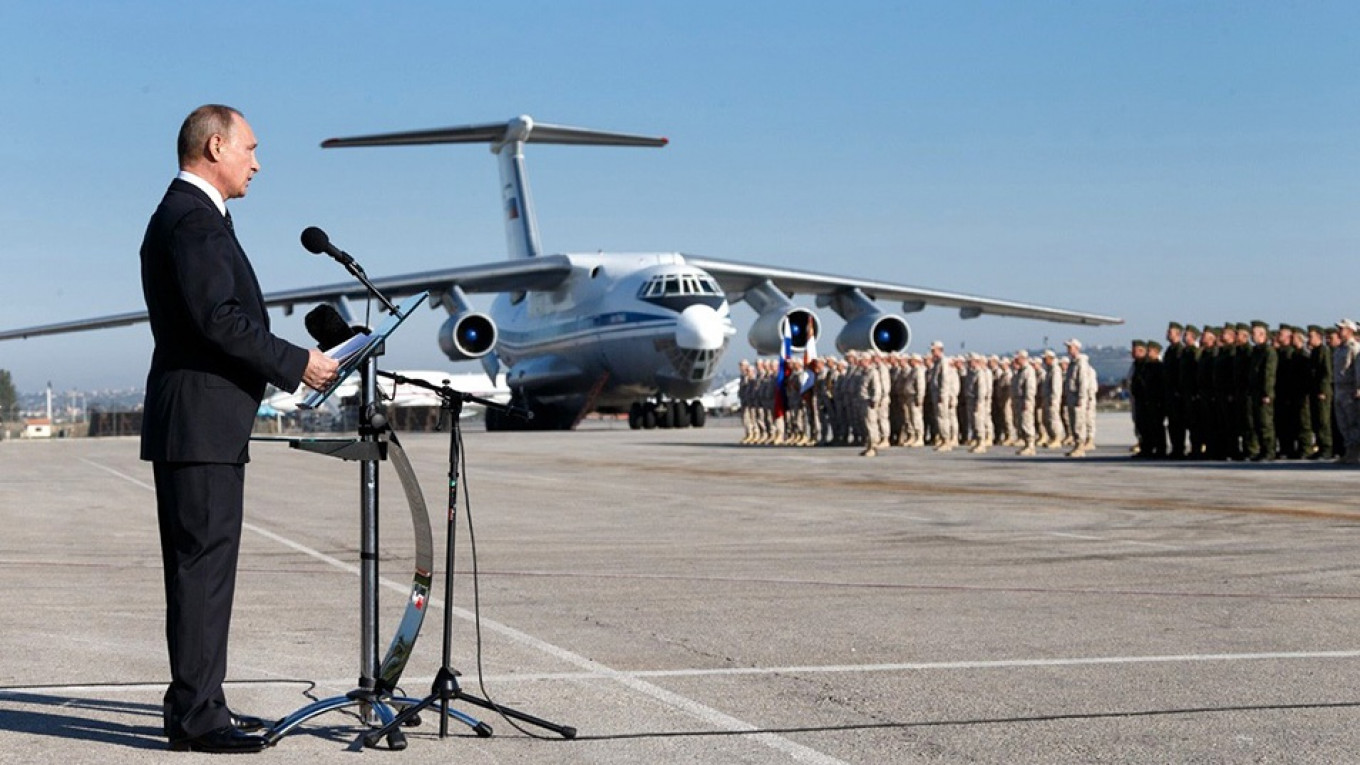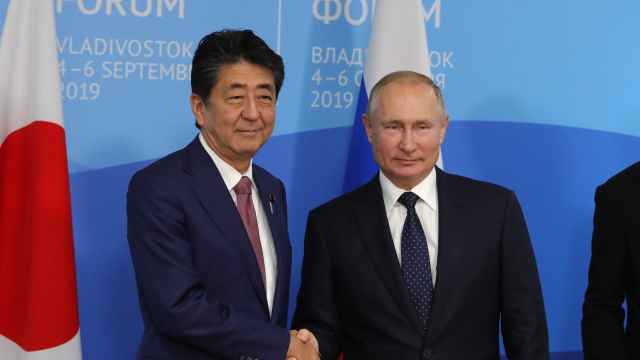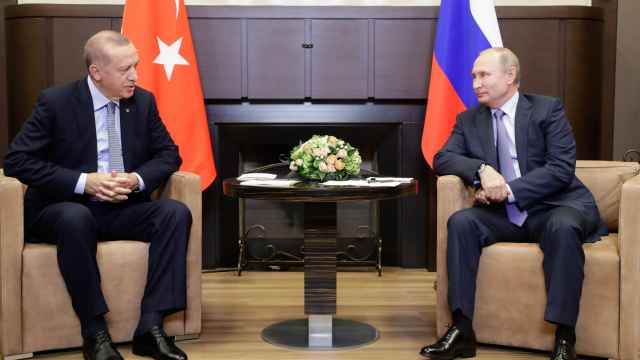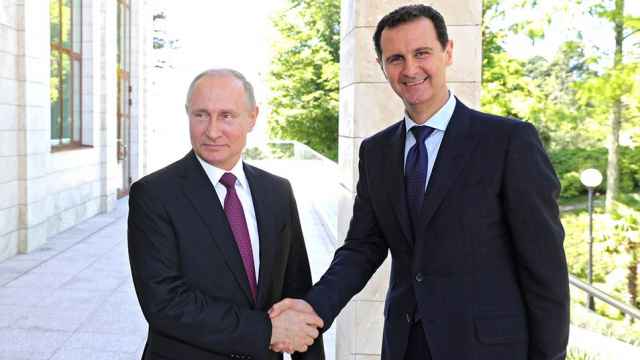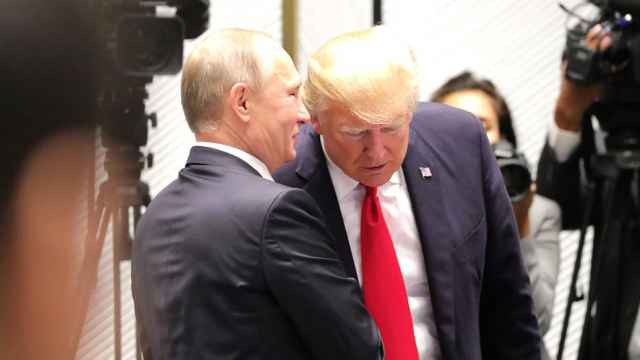All of a sudden, President Vladimir Putin is a soft touch on Syria. First, he let President Recep Tayyip Erdogan of Turkey persuade him not to begin a huge attack on the Syrian opposition in Idlib. Then he defused a conflict with Prime Minister Benjamin Netanyahu of Israel over a downed Russian military plane.
Putin’s risk-taking has shaped the outcome of the Syrian war. But in this final stage of the conflict, he is facing powerful constraints on further muscular action. One of his biggest achievements in Syria has been to show that Russia can successfully ignore the U.S. in the Middle East, and set itself up as a fast-moving, resolute, go-to player. It turns out, however, that he can no longer assume U.S. passivity, and that means being careful with U.S. allies, too.
On Sept. 17, Putin and Erdogan agreed to set up a demilitarized zone in the Syrian province of Idlib, to be jointly patrolled by Russian and Turkish troops. It was a turnabout from Russia’s earlier intention to support Syrian President Bashar al-Assad’s push to retake Idlib. It’s difficult to imagine Putin was swayed by Erdogan’s warnings that an offensive could lead to a bloodbath: In similar situations before, notably when Assad recaptured Aleppo in 2016 with Russian help, Putin ignored such warnings.
Hours after the Idlib agreement was announced, a Russian military plane carrying 14 service members was shot down over Syria. CNN, citing a U.S. government source, reported that Assad’s air defense had downed the aircraft. Kremlin propaganda outlets and internet trolls reacted with disbelief, likely anticipating official attempts to blame the incident on Israel, whose aircraft were attacking a regime target at the time. The Russian Defense Ministry then admitted that the Syrians had launched the missile, but it still blamed Israeli pilots, who, according to ministry spokesman General Igor Konashenkov, “set up” the Russian plane for the attack, using it as cover against the Syrian air defenses.
Defense Minister Sergey Shoigu made an angry call to his Israeli counterpart, and the ministry put out a statement saying it reserved the right to an “adequate response.” There will be no consequences, however: On Tuesday, Putin downplayed the incident during a press conference. Although he said he’d approved the Defense Ministry statement, the Russian president refrained from blaming Israel. He denied that the incident was in any way like the downing of a Russian fighter plane by Turkey in 2015, which lead to a temporary breakdown in Russian-Turkish relations and to Russian economic sanctions against Turkey. In a phone conversation, Putin merely called on Netanyahu to stick to deconfliction agreements.
Is Putin suddenly going soft in the Syrian endgame? In 2016, he would have been expected to defy Erdogan in Idlib and shake his fist at Netanyahu, perhaps setting off a domestic propaganda offensive against Israel and making it harder for the Israelis to attack targets in Syria. Not in late 2018, though.
The change should probably be credited to President Donald Trump. Unlike President Barack Obama, Trump has not hesitated to use force against the Assad regime. He has stepped up the U.S. military presence in Syria, and he reportedly agreed recently to keep troops there indefinitely. Erdogan’s warnings against attacking Idlib were backed up by some strong rhetoric from the U.S.
The last thing Putin wants is for the U.S., flanked by Turkey and Israel, to attack the Assad regime. He’d be pitted against three major military powers with only Iran and the feckless Assad forces as his allies. He cannot hope that recent tension between Turkey and the U.S. will translate into a breakdown of their military union: In Idlib, U.S. and Turkish interests are aligned. The balance of forces has changed since Russia entered the war three years ago, and Trump’s willingness to wade in has played a major role in bringing about the change.
Now, to hold on to the gains Putin made jointly with Assad, he needs to exercise caution. On the one hand, he’s winning points by showing a willingness to compromise; on the other hand, though, he can’t be seen as showing weakness. This is perhaps the most difficult position for the Russian leader in Syria since 2015. Whether Putin can wiggle out of it without losing face will have important consequences for Russia’s role in the Middle East.
Leonid Bershidsky is a Bloomberg Opinion columnist covering European politics and business. He was the founding editor of the Russian business daily Vedomosti and founded the opinion website Slon.ru. The views expressed in opinion pieces do not necessarily reflect the position of The Moscow Times.
A Message from The Moscow Times:
Dear readers,
We are facing unprecedented challenges. Russia's Prosecutor General's Office has designated The Moscow Times as an "undesirable" organization, criminalizing our work and putting our staff at risk of prosecution. This follows our earlier unjust labeling as a "foreign agent."
These actions are direct attempts to silence independent journalism in Russia. The authorities claim our work "discredits the decisions of the Russian leadership." We see things differently: we strive to provide accurate, unbiased reporting on Russia.
We, the journalists of The Moscow Times, refuse to be silenced. But to continue our work, we need your help.
Your support, no matter how small, makes a world of difference. If you can, please support us monthly starting from just $2. It's quick to set up, and every contribution makes a significant impact.
By supporting The Moscow Times, you're defending open, independent journalism in the face of repression. Thank you for standing with us.
Remind me later.



